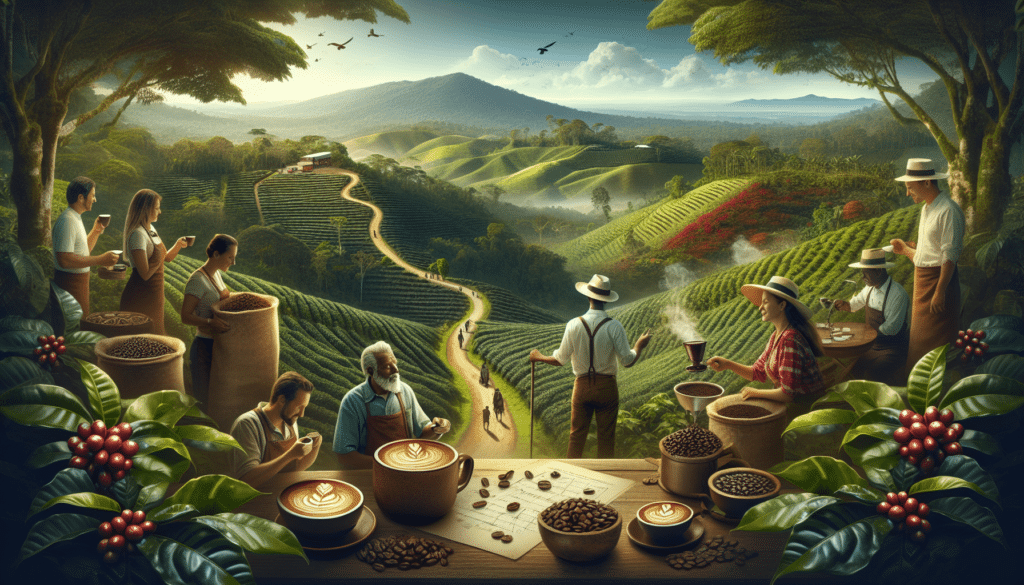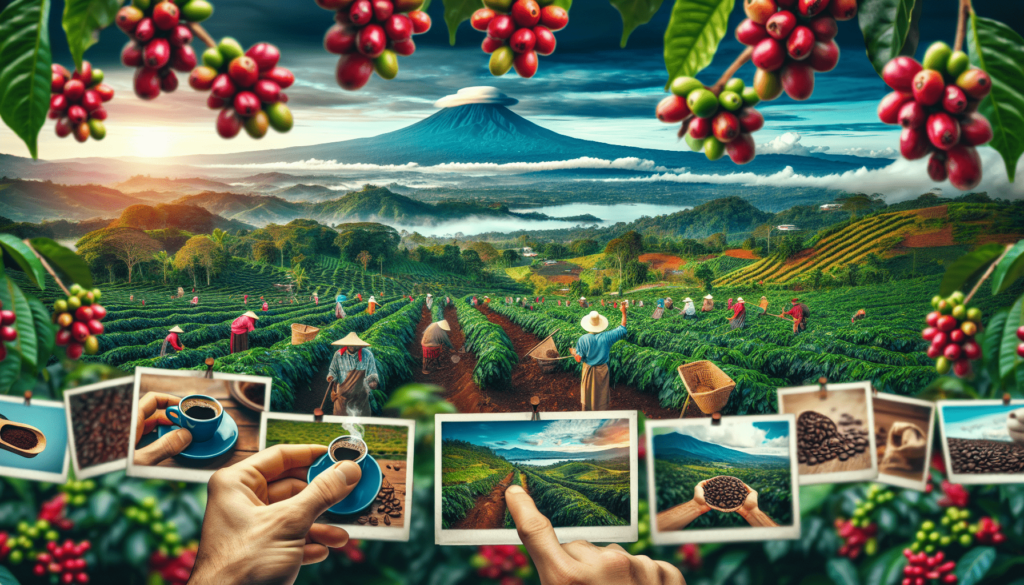Imagine yourself immersed in the stunning landscapes of Costa Rica, surrounded by lush green mountains and the aroma of freshly brewed coffee filling the air. This captivating article takes you on an adventure through the enchanting world of coffee tours in Costa Rica, providing you with the ultimate guide to creating an unforgettable coffee tour experience. From exploring coffee plantations and witnessing the intricate process of cultivation to indulging in the rich flavors of Costa Rican coffee, this article will leave you craving a sip of this exquisite beverage and yearning to embark on your own coffee journey. Get ready to awaken your senses and discover the secrets behind Costa Rica’s world-renowned coffee industry.
Understanding Costa Rican Coffee Culture
Coffee holds a special place in the hearts and minds of Costa Ricans. Understanding the origins and significance of coffee in the country is crucial to fully appreciating the Costa Rican coffee culture.
History of coffee in Costa Rica
Coffee has a long and storied history in Costa Rica. It all began in the early 19th century when coffee plants were brought over from Cuba. The fertile soil and favorable climate of Costa Rica’s highlands proved to be ideal for coffee cultivation. As the coffee industry flourished, it became one of the country’s primary exports, shaping the nation’s economy and culture.
Significance of coffee to the Costa Rican economy
Coffee plays a pivotal role in the Costa Rican economy. It is one of the country’s major export commodities and contributes significantly to its GDP. The coffee industry provides employment opportunities for thousands of Costa Ricans, both directly and indirectly. The success of the coffee market has propelled Costa Rica onto the global stage as a prominent coffee-producing nation.
Unique characteristics of Costa Rican coffee
Costa Rican coffee stands out for its exceptional quality and unique characteristics. The country’s diverse microclimates contribute to the distinct flavor profiles found in Costa Rican coffee beans. From the fruity and bright flavors of the Central Valley to the rich and chocolatey notes of the Brunca region, each cup of Costa Rican coffee is a testament to the country’s coffee expertise.
Exploring the Coffee Regions
Costa Rica boasts several distinct coffee regions, each with its own charm and coffee-growing traditions. Exploring these regions provides a deeper understanding of the country’s coffee culture.
Central Valley: The heart of Costa Rican coffee production
The Central Valley is the epicenter of coffee production in Costa Rica. This region is home to the country’s capital, San Jose, and its surrounding coffee farms. Coffee plantations here benefit from the perfect combination of altitude, volcanic soil, and favorable weather conditions. The result is a bold and well-balanced coffee that showcases the best of Costa Rican coffee craftsmanship.
Brunca: Unique climate and its influence on coffee
Located in the southern part of the country, the Brunca region boasts a unique climate that sets it apart from other coffee-growing areas. With its high altitudes and lush rainforests, this region imparts distinct flavors to the coffee beans. Brunca coffee is characterized by its deep, chocolatey taste and hints of tropical fruits. Exploring the coffee farms in Brunca offers a one-of-a-kind experience for coffee enthusiasts.
Guanacaste: A traditional coffee region blending modernity with antiquity
Guanacaste is known for its traditional coffee production methods, blending modern techniques with traditional practices. This region, with its rich history and vast coffee estates, offers a glimpse into Costa Rica’s coffee heritage. The coffee from Guanacaste is smooth and well-rounded, with a delightful balance of acidity and sweetness. Visiting Guanacaste allows travelers to witness the fusion of tradition and innovation in the Costa Rican coffee industry.

Boquete: Panama’s Coffee Jewel
Although not in Costa Rica, Boquete in neighboring Panama deserves mention for its exceptional coffee production. Its proximity to Costa Rica and shared coffee-growing techniques make it a must-visit destination for coffee enthusiasts.
A brief overview of Boquete
Nestled in the green mountains of Panama, Boquete is renowned for its world-class coffee. This charming town offers a picturesque setting, with its lush forests, rushing rivers, and vibrant flora. Boquete’s cool climate and volcanic soil provide an ideal environment for growing coffee, resulting in exceptional flavor profiles that captivate coffee connoisseurs worldwide.
Coffee production in Boquete
Boquete’s coffee production is centered around the Geisha variety, prized for its complex and floral notes. The region’s commitment to sustainable cultivation practices and meticulous harvesting methods ensures that only the finest coffee beans make it to your cup. Exploring the coffee farms in Boquete is an opportunity to learn about the artistry and hard work that goes into producing this world-renowned coffee.
Unique varieties of Boquete coffee
Boquete offers a diverse range of coffee varieties, each with its own distinct qualities. In addition to Geisha, the region is known for its Catuai and Typica varieties, with their smooth and vibrant flavors. Each sip of Boquete coffee is an exploration of the nuances and complexities that make it a true coffee lover’s delight.
Embarking on a Coffee Farm Tour
To truly immerse yourself in the Costa Rican coffee culture, embarking on a coffee farm tour is an absolute must. These tours provide an insider’s perspective on the coffee production process and offer a hands-on experience that you won’t forget.
What to expect on a coffee farm tour
Coffee farm tours offer a comprehensive look into the journey of coffee beans, from seed to cup. You can expect to walk through lush coffee plantations, witnessing firsthand the care and dedication that goes into cultivating coffee. Knowledgeable guides will explain the different cultivation methods, harvesting techniques, and coffee processing methods. You might even get a chance to participate in the coffee bean picking or roasting process!
Best coffee farms to visit
When planning your coffee tour, make sure to include visits to renowned coffee farms. Doka Estate, located in the Central Valley, is a popular choice, offering informative tours and breathtaking scenery. Finca Don Juan in Brunca and Hacienda Esperanza in Guanacaste are also must-visit destinations, providing unique insights into the local coffee traditions.
Experiencing the coffee production process
During your coffee farm tour, you’ll have the opportunity to see the entire coffee production process up close. From the moment the coffee cherries are picked to the roasting and packaging, you’ll gain an appreciation for the immense effort and skill required to produce a perfect cup of coffee. Sampling freshly brewed coffee from the very beans you watched being harvested will be a highlight of your tour.

Participating in a Coffee Tasting Session
Once you’ve gained an understanding of Costa Rican coffee production, it’s time to sharpen your palate and refine your coffee tasting skills. Participating in a coffee tasting session, also known as cupping, allows you to truly appreciate the flavors and aromas found in Costa Rican coffee.
The art and science of coffee tasting
Coffee tasting is a sensory experience that combines the art of perception with the science of flavor analysis. A trained coffee taster, or “cupper,” evaluates the aroma, acidity, body, and flavor of the coffee. By focusing on these elements, you can develop a nuanced understanding of the different coffee profiles and enhance your overall coffee tasting experience.
Identifying flavors and aromatic notes in Costa Rican coffee
Costa Rican coffee is known for its wide range of flavors and aromatic notes. From its bright citrus nuances to its rich chocolate undertones, each region and farm offers its unique signature taste. Participating in a coffee tasting session allows you to identify these flavors and understand how they develop in different coffee beans.
Coffee tasting etiquette
When participating in a coffee tasting session, it’s important to observe proper etiquette. Approach each cup with an open mind and take time to appreciate the coffee’s aroma before taking the first sip. Use the cupping spoon to slurp the coffee, allowing the flavors to fully coat your palate. Remember to cleanse your palate with water between tastings to ensure an accurate assessment of each coffee’s characteristics.
Meeting the Coffee Farmers
No coffee tour is complete without getting to know the passionate individuals behind the beans. Meeting coffee farmers provides valuable insights into their way of life, the challenges they face, and their commitment to producing exceptional coffee beans.
The importance of smallholder farmers in Costa Rica’s coffee sector
Smallholder farmers form the backbone of Costa Rica’s coffee sector. These hardworking individuals often own small plots of land and employ traditional farming methods. Despite facing various hurdles, such as climate change and fluctuating market conditions, these farmers play a vital role in preserving the authenticity and heritage of Costa Rican coffee.
Understanding the coffee farmer’s lifestyle and work
Coffee farming is a labor of love, requiring immense dedication and expertise. Meeting coffee farmers allows you to understand their daily routines, from tending to the coffee plants to harvesting the ripe cherries. You’ll gain insight into the challenges they face, such as weather fluctuations and pests, and appreciate the level of skill and care required to produce high-quality coffee.
Role of coffee cooperatives
Coffee cooperatives play a crucial role in supporting smallholder farmers and ensuring fair trade practices. These cooperatives provide resources, training, and access to markets for farmers, allowing them to earn a sustainable livelihood. Meeting coffee farmers who are part of these cooperatives offers a deeper understanding of the importance of social and economic sustainability within the coffee industry.

The Impact of Sustainable Coffee Production
Costa Rica is known for its commitment to sustainability in coffee production. Embracing sustainable practices not only benefits the environment but also enhances the overall quality of the coffee.
Sustainable coffee production practices in Costa Rica
Costa Rica leads the way in sustainable coffee production. Farmers employ methods such as shade-grown coffee, which preserves biodiversity and minimizes the need for chemical fertilizers. Many farms also integrate agroforestry practices, cultivating coffee alongside other plants. These sustainable practices protect ecosystems, reduce environmental impact, and ensure the longevity of the coffee industry.
How sustainability affects coffee quality
Sustainable coffee production goes hand in hand with coffee quality. By prioritizing environmental conservation, coffee farmers create a harmonious environment for the coffee plants to thrive. This results in healthier, more robust coffee beans with deeper flavors and enhanced aromatic profiles. Sustainable practices not only ensure a greener future but also guarantee a superior coffee experience for consumers.
Coffee and wildlife conservation
Costa Rica’s commitment to sustainability extends beyond coffee production. The country is known for its rich biodiversity and thriving ecosystems. By embracing sustainable coffee practices, farmers contribute to the preservation of these natural habitats and protect the wildlife that calls Costa Rica home. The symbiotic relationship between coffee farming and wildlife conservation is a testament to the country’s dedication to environmental stewardship.
Costa Rican Coffee Souvenirs
No coffee tour is complete without bringing home some Costa Rican coffee delights. From renowned coffee brands to unique coffee-related souvenirs, there are plenty of options to choose from.
Popular Costa Rican coffee brands for souvenirs
Costa Rica is home to numerous coffee brands that have gained international recognition. Café Britt is one of the most well-known, offering a wide range of single-origin and blended coffees. Tarrazu, Tres Rios, and Poas Volcanic Estate are also renowned for their high-quality beans. These brands make for perfect souvenirs, allowing you to savor the flavors of Costa Rica long after your trip ends.
Other coffee-related souvenirs
In addition to coffee beans, Costa Rica offers a variety of coffee-related souvenirs. Coffee-themed artwork, mugs, and t-shirts are popular choices for coffee enthusiasts looking to commemorate their coffee tour experience. Handmade coffee filters and coffee-scented candles are unique items that capture the essence of Costa Rican coffee culture.
Where to buy coffee souvenirs
Coffee souvenirs can be found in various locations throughout Costa Rica. Specialty coffee shops, tourist markets, and even some coffee farms offer a wide selection of coffee beans and souvenirs. San Jose, the capital city, is home to numerous coffee shops and stores where you can find the perfect memento to remind you of your Costa Rican coffee adventure.

Accommodation and Transportation Options
Planning your Costa Rican coffee tour involves considering the best accommodation and transportation options to suit your needs and enhance your overall experience.
Best accommodation options for coffee lovers
Costa Rica offers a range of accommodation options, each providing a unique experience for coffee lovers. Coffee-themed lodges and boutique hotels immerse guests in the local coffee culture, offering guided tours, coffee workshops, and even private coffee tastings. Staying at these specialized accommodations provides the perfect opportunity to fully immerse yourself in the world of Costa Rican coffee.
How to get around coffee regions
Navigating the coffee regions of Costa Rica is relatively easy, thanks to the country’s well-connected transportation network. Renting a car allows for greater flexibility and the ability to explore remote coffee farms at your own pace. Public buses are also a reliable and affordable option, providing access to both major cities and rural areas. Additionally, guided tours and private transportation services can be arranged to ensure a smooth and hassle-free coffee tour experience.
Tips for planning your coffee tour journey
When planning your coffee tour in Costa Rica, consider a few key tips. Research the coffee regions and select those that align with your preferences and interests. Determine the length of your stay and allocate sufficient time to fully explore each region. Consider the best time to visit, as coffee harvests and festivals may vary throughout the year. Lastly, don’t forget to pack comfortable clothing, sturdy shoes, and your favorite coffee tasting tools to fully enjoy your coffee tour adventure.
Coffee-related Events and Festivals
For an immersive cultural experience, attending coffee-related events and festivals in Costa Rica is a must. These celebrations showcase the vibrancy and pride of the Costa Rican coffee culture.
Major coffee-related events in Costa Rica
Costa Rica hosts several significant coffee events throughout the year. The Coffee Expo, held in San Jose, brings together coffee enthusiasts, industry professionals, and farmers for a comprehensive exploration of Costa Rican coffee. The Cup of Excellence competition showcases the finest coffee beans, with participants from all over the country vying for recognition and awards. These events offer a unique opportunity to learn, taste, and celebrate all things coffee in Costa Rica.
Experience local culture at coffee festivals
Coffee festivals are an integral part of Costa Rican culture and serve as a platform to honor the country’s coffee heritage. The National Coffee Day, celebrated on September 12th, is a joyous occasion filled with music, dance, and, of course, plenty of coffee. Participating in these festivals allows you to mingle with locals, join in the festivities, and gain a deeper appreciation for the role that coffee plays in Costa Rican society.
Best time to attend coffee events and festivals
The best time to attend coffee events and festivals in Costa Rica may vary depending on the specific event and region. Research the dates and locations of the festivals you wish to attend and plan your visit accordingly. It’s worth noting that coffee harvests typically take place between November and February, making this period an excellent time to immerse yourself in the coffee culture and witness the coffee production process firsthand.
In conclusion, embarking on a coffee tour in Costa Rica offers an unparalleled experience for coffee lovers. From delving into the country’s rich coffee history to exploring the diverse coffee regions and meeting passionate coffee farmers, this journey allows you to fully grasp the intricacies of Costa Rican coffee culture. By participating in coffee tastings, attending events, and bringing home Costa Rican coffee souvenirs, you can savor the flavors and memories of this coffee paradise long after your tour ends. So grab your cup, take a sip, and let Costa Rica’s coffee culture captivate you.







0 Comments